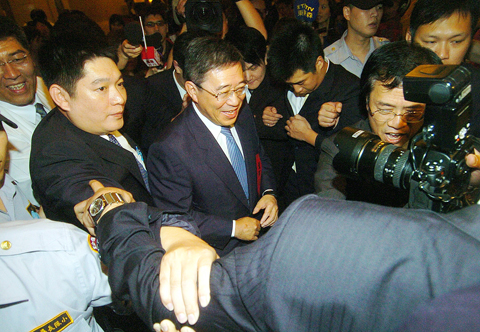Walter Wang (王文祥), a son of Formosa Plastics Group’s (FPG, 台塑集團) founder Wang Yung-ching (王永慶), was elected to the board of oil-refining unit Formosa Petrochemical Corp (台塑石化) yesterday, ending speculation that his older brother Winston Wong (王文洋), who had held the seat, would return to the nation’s biggest diversified industrial group.
Sister Susan Wang (王瑞華) and cousin Wilfred Wang (王文潮), chairman of Taipei-listed Formosa Petrochemical, were re-elected to the 15-member board during a shareholders meeting.
The eldest Wang son, Winston, left his job as a senior vice president of Taipei-listed Nan Ya Plastics Corp (南亞塑膠), a Formosa unit, in November 1995 after media reports of an extramarital affair.

PHOTO: CHANG CHIA-MING, TAIPEI TIMES
His father then “banished” him to the US.
Winston founded Grace THW Group (宏仁企業集團) in Guangzhou, China, in 1996, which manufactures plastics and components for plates that hold semiconductors and other parts of electronic devices. The company is not affiliated with Grace Semiconductor Manufacturing Corp (宏力半導體), which he cofounded in China with a son of former Chinese president Jiang Zemin (江澤民) in 2000.
The 58-year-old Winston filed suit in Newark, New Jersey, on May 13, seeking to manage his father’s fortune. Billionaire Wang Yung-ching died without a will at age 91 last October in New Jersey while on a trip to inspect the conglomerate’s US factories.
Winston claims his father’s widow, Wang Yueh-lan (王月蘭), deserves half of the estate because they had been married since 1935.
The couple had no children, though the billionaire had nine children with “female companions,” including the mother of Winston and Walter, papers filed in the suit state.
The estate includes US$1.7 billion in assets in Taiwan, US$1 billion in a Credit Suisse Group AG account and US$7.5 billion in several offshore trusts and a US trust, the suit said.
Winston was “unaware of any evidence” that his father had authorized the creation of those trusts, the suit said.
Wilfred told reporters waiting for the results of the company’s board of directors election that the decision to replace Winston with Walter on the board was made after family discussions.
“We respect the decision made by our siblings,” the local business news Web site cnYes.com quoted Wilfred as saying.
He said, however, that he had no idea whether Walter would accept the seat.
Winston’s absence may be better for the refiner, as his return might spark an internal power struggle, said Michael On (洪瑞泰), president of Taipei-based Beyond Asset Management Co (晉昂證券投顧).
FPG is currently run by a seven-person executive board headed by Wang Yung-ching’s nephew William Wong (王文淵) and Susan Wang.
There have been rumors that Winston wanted to use his position on Formosa Petrochemical’s board as a first step toward returning to FPG.
Taipei-listed Formosa Plastics Corp (台塑), the group’s polyvinyl chloride making unit, will elect its board of directors at its annual general meeting today.
“I’m very nervous and worried about what Winston Wong may do next,” said Huang Hsueh-fen (黃雪芬), a Formosa Petrochemical shareholder who attended yesterday’s meeting.
The refiner fell 1.3 percent in Taipei trading before the meeting to close at NT$82.
Formosa Petrochemical’s profit plunged 78 percent last year after lower crude-oil prices cut the value of its inventories. Its stock has climbed 21 percent this year, compared with a 48 percent gain in the benchmark TAIEX.

Sweeping policy changes under US Secretary of Health and Human Services Robert F. Kennedy Jr are having a chilling effect on vaccine makers as anti-vaccine rhetoric has turned into concrete changes in inoculation schedules and recommendations, investors and executives said. The administration of US President Donald Trump has in the past year upended vaccine recommendations, with the country last month ending its longstanding guidance that all children receive inoculations against flu, hepatitis A and other diseases. The unprecedented changes have led to diminished vaccine usage, hurt the investment case for some biotechs, and created a drag that would likely dent revenues and

Global semiconductor stocks advanced yesterday, as comments by Nvidia Corp chief executive officer Jensen Huang (黃仁勳) at Davos, Switzerland, helped reinforce investor enthusiasm for artificial intelligence (AI). Samsung Electronics Co gained as much as 5 percent to an all-time high, helping drive South Korea’s benchmark KOSPI above 5,000 for the first time. That came after the Philadelphia Semiconductor Index rose more than 3 percent to a fresh record on Wednesday, with a boost from Nvidia. The gains came amid broad risk-on trade after US President Donald Trump withdrew his threat of tariffs on some European nations over backing for Greenland. Huang further

CULPRITS: Factors that affected the slip included falling global crude oil prices, wait-and-see consumer attitudes due to US tariffs and a different Lunar New Year holiday schedule Taiwan’s retail sales ended a nine-year growth streak last year, slipping 0.2 percent from a year earlier as uncertainty over US tariff policies affected demand for durable goods, data released on Friday by the Ministry of Economic Affairs showed. Last year’s retail sales totaled NT$4.84 trillion (US$153.27 billion), down about NT$9.5 billion, or 0.2 percent, from 2024. Despite the decline, the figure was still the second-highest annual sales total on record. Ministry statistics department deputy head Chen Yu-fang (陳玉芳) said sales of cars, motorcycles and related products, which accounted for 17.4 percent of total retail rales last year, fell NT$68.1 billion, or

Macronix International Co (旺宏), the world’s biggest NOR flash memory supplier, yesterday said it would spend NT$22 billion (US$699.1 million) on capacity expansion this year to increase its production of mid-to-low-density memory chips as the world’s major memorychip suppliers are phasing out the market. The company said its planned capital expenditures are about 11 times higher than the NT$1.8 billion it spent on new facilities and equipment last year. A majority of this year’s outlay would be allocated to step up capacity of multi-level cell (MLC) NAND flash memory chips, which are used in embedded multimedia cards (eMMC), a managed